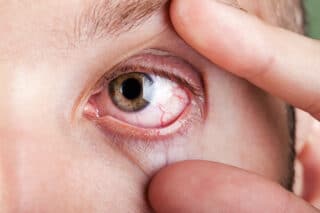
NewView Laser Eye, Inc.
12110 Sunset Hills Road
Suite 50
Reston, VA 20190
NewView Laser Eye, Inc.
20 Davis Ave SW
Leesburg, VA 20175

More Vision & Eye Care Articles
Eye Allergies

Eye allergies, called allergic conjunctivitis, are a common condition that occurs when the eyes react to something that irritates them (called an allergen). The eyes produce a substance called histamine to fight off the allergen. As a result, the eyelids and conjunctiva – the thin, filmy membrane that covers the inside of your eyelids and the white part of your eye (sclera) – become red, swollen and itchy, with tearing and burning. Unlike bacterial or viral conjunctivitis, allergic conjunctivitis is not spread from person to person.
The most common eye allergy symptoms include:
- Red, swollen or itchy eyes
- Burning or tearing of the eyes
- Sensitivity to light
People who suffer from eye allergies usually (though not always) have nasal allergies as well, with an itchy, stuffy nose and sneezing. It is usually a temporary (acute) condition associated with seasonal allergies. However, in other cases, eye allergies can develop from exposure to other environmental triggers, such as pet dander, dust, smoke, perfumes, or even foods. If the exposure is ongoing, the allergies can be more severe, with significant burning and itching and even sensitivity to light.
Many eye allergies are caused by the body’s response to allergens in the air – both indoors and out – such as dust, pet dander, mold, or smoke. Some of the most common airborne allergens include pollen from grass, trees and ragweed, contributing to seasonal allergies.
Some people can inherit eye allergies from their parents. You’re more likely to have allergies if both of your parents have them than if only one does.
To provide proper treatment, your ophthalmologist will check to see whether your symptoms are related to an eye infection or allergic conjunctivitis. He or she can usually diagnose allergic conjunctivitis easily by examining your eyes and discussing your medical history – including your history and your family’s history of allergies.
The key to treating eye allergies is to avoid or limit contact with the substance causing the problem. But you have to know what to avoid. If necessary, an allergist can perform a skin or blood test to help identify the specific allergen(s). Those most common are:
- Pollen
- Mold
- Dust
- Pets
- There are various forms of treatment for eye allergies including eyedrops and medicines
- Artificial tears
- Decongestants (with or without antihistamines)
- Oral antihistamines
- Antihistamine/mast-cell stabilizers
- Corticosteroids
- Immunotherapy shots
Your doctor can help determine which treatments are best for you.
Other Articles You May Find of Interest...
- Dry Eye Relief Is In Sight With Optilight
- iDesign Advanced WaveScan Studio
- Norcross Vision Innovators: Glaucoma and Cataract Solutions
- Exploring the Benefits Of Intense Pulsed Light (IPL) For Ocular Surface Health
- Lose Years Off Your Face In Just One Hour
- How to Find a Great Online Shop Offering Same Day Glasses Shipping: Your Quick Guide
- March Is Workplace Eye Wellness Month

















